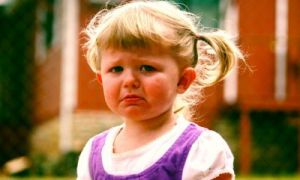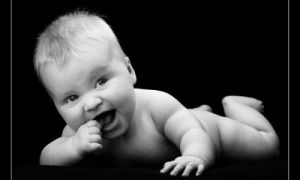From when an infant is born the part of the brain that controls vital functions like sucking, swallowing and breathing are ready to go, However the part that controls the neck muscles, arms, legs, etc is still under development until an infant achieves Gross Motor Development.
Gross Motor Development Milestones
From 0 to 4 months
Infants begin to use their senses to learn to interact with the environment around them as their bodies grow stronger. From when an infant is born the part of the brain that controls vital functions like sucking, swallowing and breathing are ready to go, however the part that controls the neck muscles, arms, legs, etc is still under development.
Milestones Achieved
- moves whole body
- squirms, arms wave, legs move up and down
- eating and sleeping patterns
- startle reflex when placed unwrapped on flat surface/when hears loud noise
- head turns to side when cheek touched
- sucking motions with mouth (seeking nipple)
- responds to gentle touching, cuddling, rocking
- shuts eyes tight in bright sunlight
- able to lift head and chest when laying on stomach
- begins to roll from side to side
- starts reaching to swipe at dangling objects
- able to grasp object put into hands
From 4 to 8 months
Another milestone an infant will achieve at around this age is positioning themselves on their stomach and resting their weight on their forearms first and then later can support the body with arms extended.
Milestones Achieved
- plays with feet and toes
- makes effort to sit alone, but needs hand support
- raises head and chest when lying on stomach
- makes crawling movements when lying on stomach
- rolls from back to stomach
- reaches for and grasp objects, using one hand to grasp
- eyes smoothly follow object or person
- crawling movements using both hands and feet
- able to take weight on feet when standing
- watch activities across the room - eyes move in unison
- turns head to the sound of voices
From 8 to 12 months
There are so many things for an infant to discover and during this stage. It’s all about exploration through looking and touching. An infant will spend most of their time watching the world around them, taking in information, getting directly involved and often combining both touch and sight.
Milestones Achieved
- pulls self to standing position when hands held
- raises self to sitting position
- sits without support
- stands by pulling themself up using furniture
- stepping movements around furniture
- successfully reach out and grasp a toy
- transfers objects from hand to hand
- picks up and pokes small objects with thumb and finger
- picks up and throws small objects
- holds biscuit or bottle
- crawls
- mature crawling (quick and fluent)
- may stand alone momentarily
- may attempt to crawl upstairs
- grasps spoon in the palm, but poor aim of food to the mouth
- uses hands to feed self
- alerts peripheral vision
- rolls ball and crawls to retrieve
An infant’s physical development at this stage is working towards the next achievement from being able to crawl to finally ‘walking’. Mobility changes your baby's life and through the gross motor milestones an infant achieves at this stage, once the crawling begins there will be no stopping them.


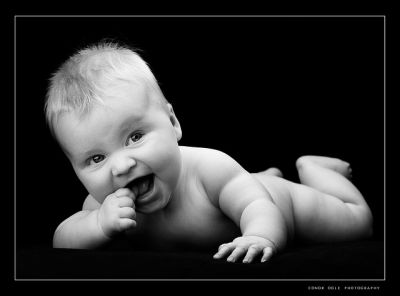
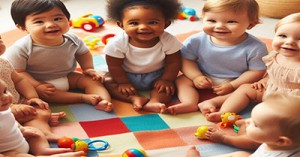

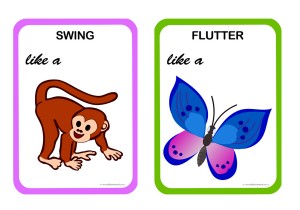
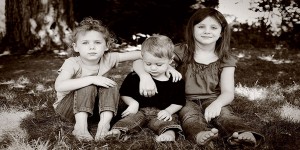
 Toddlers have a greater understanding of the world around them by this stage. Their cognitive development (also known as intellectual development and thinking skills) continues
Toddlers have a greater understanding of the world around them by this stage. Their cognitive development (also known as intellectual development and thinking skills) continues Infants begin to develop trust when parents begin to fulfil their needs. Such as changing an infant's nappy when needed, feeding on request and holding
Infants begin to develop trust when parents begin to fulfil their needs. Such as changing an infant's nappy when needed, feeding on request and holding Beginning at birth the construction of thought processes, such as memory, problem solving, exploration of objects etc, is an important part of an infant’s cognitive
Beginning at birth the construction of thought processes, such as memory, problem solving, exploration of objects etc, is an important part of an infant’s cognitive Toddlers want to do more on their own and do not like it when you begin to establish limits on their behaviour. Tantrums can become
Toddlers want to do more on their own and do not like it when you begin to establish limits on their behaviour. Tantrums can become Your preschooler is now able to focus their attention more accurately and is less influenced by distractions. The intensity of questions increase as your child
Your preschooler is now able to focus their attention more accurately and is less influenced by distractions. The intensity of questions increase as your child John Dewey is often seen as the proponent of learning by doing – rather than learning by passively receiving. He believed that each child was active,
John Dewey is often seen as the proponent of learning by doing – rather than learning by passively receiving. He believed that each child was active, Toddler advance and gains new skills in Gross Motor Development milestones achieved throughout earlier years. Co-ordination and challenges that could not be performed before such
Toddler advance and gains new skills in Gross Motor Development milestones achieved throughout earlier years. Co-ordination and challenges that could not be performed before such Erik Erikson developed a psychosocial theory to understand how we each develop our identities through eight stages of psychosocial development from infancy to adulthood. The
Erik Erikson developed a psychosocial theory to understand how we each develop our identities through eight stages of psychosocial development from infancy to adulthood. The At this point preschoolers begin to interact effectively with others. Play becomes more innovative and organized and “boyfriend” or “girlfriend” begins to emerge. Preschoolers have
At this point preschoolers begin to interact effectively with others. Play becomes more innovative and organized and “boyfriend” or “girlfriend” begins to emerge. Preschoolers have From now, babies begin to identify and respond to their own feelings, understanding other's feelings & needs and interact positively with others. A baby's social and
From now, babies begin to identify and respond to their own feelings, understanding other's feelings & needs and interact positively with others. A baby's social and